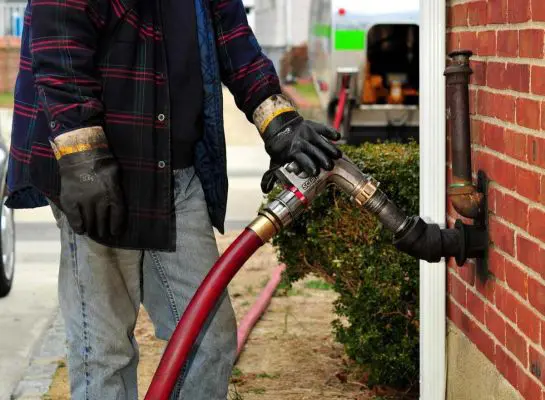Heating Oil Emergencies Require 24/7 Customer Service
It’s freezing. It’s sleeting. Suddenly the alarm on the heating system sounds, and the temperature in the house and around the water pipes starts dropping quickly. The system is out of heating oil. The homeowner calls the customer service number on her contract. If she can’t talk to a customer service rep immediately, she is not going to hesitate to call one of your competitors. Who can blame her? She needs service, and she needs it now. And when your competitor delivers her oil, you may just loose that customer for good.
On the other hand, if your customer service call center is competent, that customer might spread the news of your excellent emergency service to her friends and family, potentially earning you new customers.

What’s Involved in Heating Oil and Gas Customer Service?
In order to provide excellent customer service to heating oil and gas clients, your company requires 24/7 answering services and immediate message delivery to the right service technician. Providing customer satisfaction should be your number one priority, along with prompt and reliable service technicians and oil delivery.
Heating oil and gas delivery and services are highly regulated and require attention to detail and safety. An experienced call center can manage communications and help oil and gas companies achieve success in three specific ways.
1: Employee Check-In
Since service technicians in oil and gas delivery work alone, they are required to check in regularly. A call center can monitor check-ins and react professionally when a situation needs escalation. If a situation arises that requires the response of an emergency professional, a call center will follow procedures to ensure safety. The call center will also document the entire process. The heating oil or gas company can depend on all call center staff to act exactly according to the procedure, ensuring that regulations are met, and technicians are in good hands.
2: Fast Response
In heating oil and gas there is a need for a fast emergency response. A call center ensures that when the call is made for emergency assistance, that call is answered, no matter the time or day. Statistics show that customers appreciate speaking with a live person who knows exactly what to do in a heating emergency. The call center can then dispatch an available service or delivery technician.
3: Excellent Customer Service
A call center provides excellent live customer service for sales, support, and emergency response. Call center staff work 24/7 and have the procedures, tools, and training to find solutions for your customers. Operators act as an extension of your company to provide the same level of customer service you expect from your own employees. Call centers often provide a checklist that can more easily facilitate the type of service required. For instance, the call center may ask the following questions, and can sometimes even troubleshoot a quick fix based on responses to these questions:
- Is the heat emergency switch on?
- Have you checked whether you have enough oil in your tank?
- What is your thermostat setting?
- Have you checked your fuse box or circuit panel?
- Are the batteries good in your thermostat?
- Are the oil burner switches on?
Many heating companies offer automatic oil delivery, discounts, 24/7 emergency oil delivery, and they ensure there is always oil and gas on hand in a bulk storage facility. They should also offer excellent, live customer service.
There are many ways oil and gas heating companies can benefit from call center services. Give Anserve a call at 800.980.9770 to see if your company would benefit from partnering with us.

Director of Business Development
With over 25 years of experience, Peter oversees the marketing, sales and account management for Anserve. He is an expert in customer service and strategic business growth, leveraging his knowledge to help businesses optimize revenue using efficient procedures.


